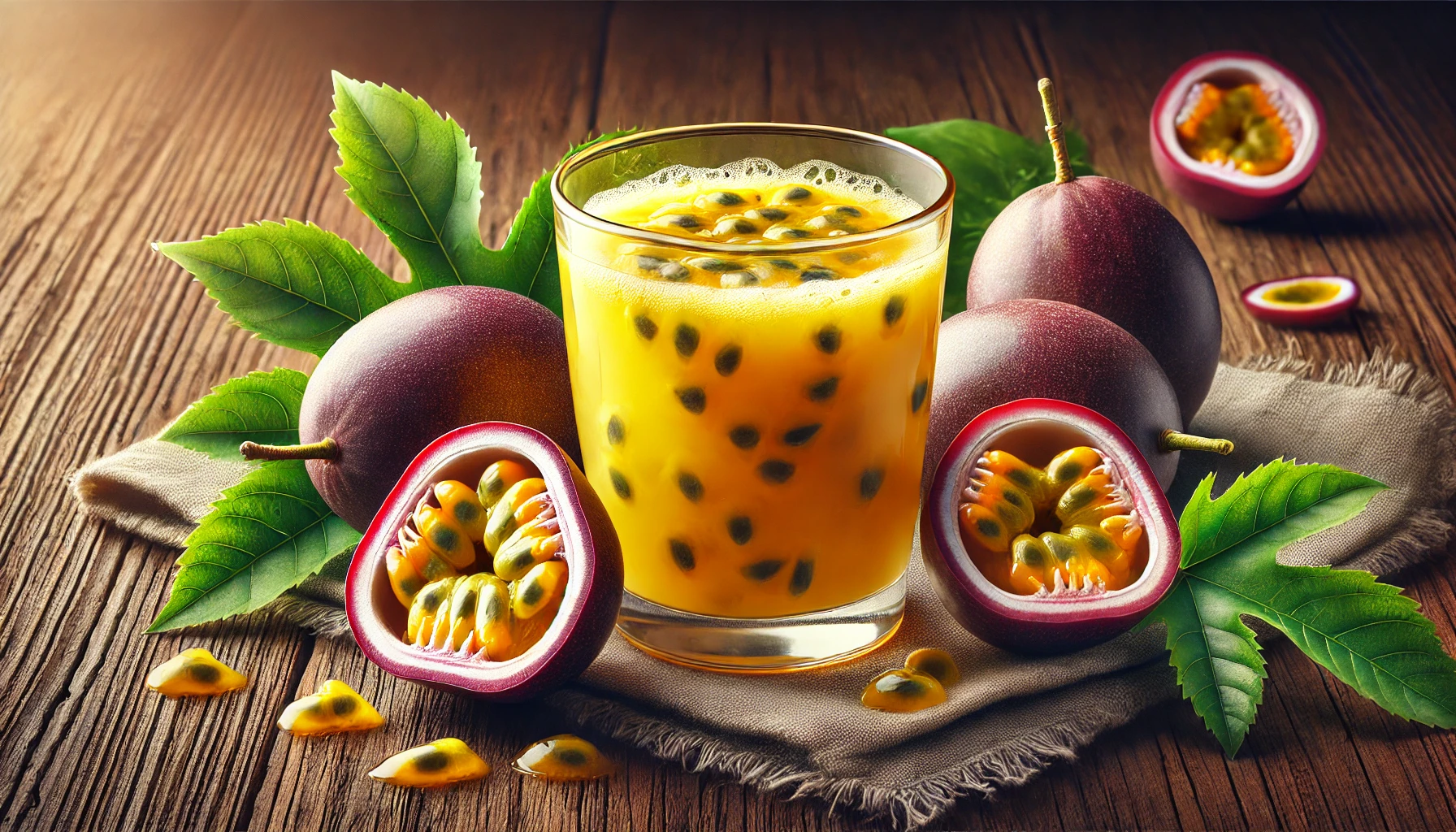Health Notice: This article was written using the Consensus AI Academic Search Engine. It is intended solely for informational purposes and should not be considered medical advice. Always consult a licensed healthcare provider for diagnosis, treatment, or medical guidance. Please refer to the full Disclaimer at the end of this article.
Passion fruit, scientifically known as Passiflora edulis, is a tropical fruit renowned for its unique flavor and numerous health benefits. This article explores the nutritional profile, health benefits, potential risks, and preparation methods of passion fruit, drawing on recent scientific research.
Health Benefits of Passion Fruit
Cardiovascular Health
Passion fruit peel juice has been shown to positively affect lipid profiles in patients with type 2 diabetes mellitus. A study demonstrated that consuming 250 ml of yellow passion fruit peel juice daily for 15 days significantly decreased the LDL to HDL cholesterol ratio, which is a predictor of cardiovascular disease1. Another study confirmed that the juice increased HDL levels and decreased LDL levels in diabetic patients, highlighting its potential in managing dyslipidemia7.
Antioxidant Properties
Passion fruit is rich in polyphenols, which have potent antioxidant properties. Research comparing the polyphenol content of Passiflora ligularis (a type of passion fruit) and green tea found that both had significant hypoglycemic and antilipemic activities. The polyphenols from passion fruit effectively reduced triglyceride levels and glycemia in overweight rats, suggesting similar benefits in humans2. Additionally, passion fruit peel flour has been shown to reduce lipid peroxidation in the kidneys and improve antioxidant enzyme activities in the liver5.
Digestive Health
The high fiber content in passion fruit peel can enhance digestive health. Studies have shown that passion fruit peel increases the production of short-chain fatty acids (SCFAs) in the colon, which are beneficial for maintaining bowel health. The peel’s fiber content serves as a substrate for enteric bacteria, promoting a healthy gut microbiota4.
Metabolic Health
Passion fruit peel flour has been used in traditional medicine to treat metabolic disorders. Research indicates that it can mitigate the adverse effects of a high-fat diet, such as insulin resistance and hepatic steatosis. Mice fed a cafeteria diet supplemented with passion fruit peel flour showed improved glucose tolerance and insulin sensitivity6.
Respiratory Health
Purple passion fruit peel extract has been found to alleviate asthma symptoms. In a clinical trial, adults with asthma who took the extract experienced significant reductions in wheezing, coughing, and shortness of breath. The extract also improved forced vital capacity, indicating better lung function10.
Nutritional Profile
Passion fruit is a nutrient-dense fruit, rich in vitamins A and C, dietary fiber, and beneficial plant compounds like polyphenols and carotenoids. The peel, often discarded, contains high levels of soluble fiber and antioxidants, making it a valuable byproduct for health applications3 9.
Potential Risks
While passion fruit offers numerous health benefits, it is essential to consume it in moderation. Excessive intake of passion fruit peel or its extracts may lead to digestive discomfort due to its high fiber content. Additionally, individuals with allergies to latex or related fruits should exercise caution, as passion fruit may trigger allergic reactions.
Preparation Methods
Passion fruit can be enjoyed in various forms, including fresh, juiced, or as an ingredient in desserts and beverages. The peel can be processed into flour and used as a dietary supplement. Here are some popular preparation methods:
- Fresh Consumption: Scoop out the pulp and seeds and eat them directly or add them to salads and yogurt.
- Juice: Blend the pulp with water and strain to make a refreshing juice.
- Desserts: Use the pulp in cakes, mousses, and sorbets for a tropical flavor.
- Peel Flour: Dry and grind the peel into flour, which can be added to smoothies, baked goods, or used as a thickening agent.
Conclusion
Passion fruit is a versatile and nutritious fruit with a wide range of health benefits, from improving cardiovascular and digestive health to offering antioxidant and anti-inflammatory properties. While it is generally safe for consumption, moderation is key to avoiding potential adverse effects. Incorporating passion fruit into your diet can be a delicious way to boost your overall health.
Disclaimer
The content in this blog post was generated using Consensus, an AI-powered academic search engine, and is based on publicly available scientific literature. While we strive to provide accurate, up-to-date, and well-researched information, this content is intended for informational and educational purposes only.
It does not constitute medical advice, diagnosis, or treatment. Always consult a qualified healthcare professional before making decisions related to any medical condition, treatment, or medication.
The AI system’s analysis may not account for all perspectives, ongoing research, or individual circumstances, and should not replace professional expertise. Neither the blog publisher nor the developers of the Consensus AI tool are liable for any decisions or actions taken based on this content.
Use of this information is at your own risk. Where provided, citations link to original scientific studies for reference only—these should be reviewed independently and interpreted with the support of a qualified medical or research professional.
If you are experiencing a medical emergency, please seek immediate care from a healthcare provider or call emergency services.
